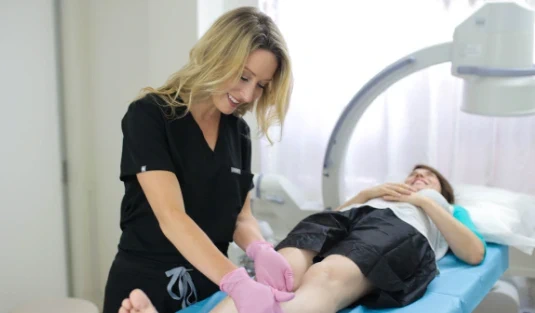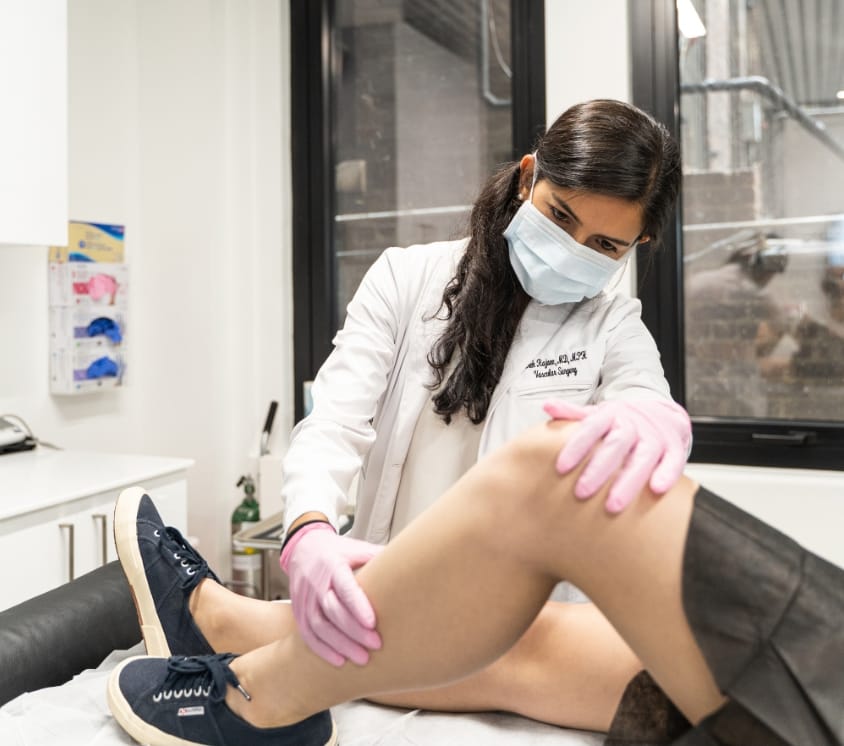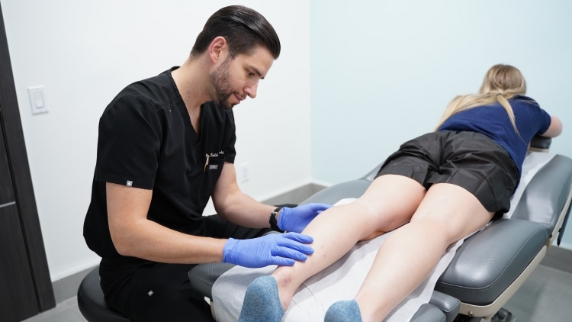The world has numerous people who have chronic venous insufficiency symptoms. CVI is a condition that occurs when there is a problem with the one-way valves in the veins. If these get blocked or damaged, they can interfere with the natural flow of blood from your legs to the heart. To be more accurate when defining chronic venous insufficiency, it’s vital to note that finally some of the blocked blood will end up in the heart and the remainder will flow back down to the feet. Then, it will start to pool in the veins and that’s where the biggest problem will begin.
The heart will be deprived and in turn affect other major body organs that need constant supply of oxygenated blood to function properly. Besides, venous refluxing will slowly make the vein walls swell, enlarge and twist (become varicose veins). Varicose veins should be examined by the top vein doctor Clifton NJ as soon as they show up. This will prevent them from worsening and causing severe leg damage such as venous ulcers and deep vein thrombosis.
How common are venous insufficiency symptoms?
There is about two to five percent of the USA adult population who suffers from chronic venous insufficiency. It affects mostly women who are between forty to forty-nine years and males who are seventy to seventy-nine years old. However, both genders can develop venous insufficiency symptoms in their younger years depending on their risk level. But, ladies will always have a bigger risk than males. Age is, therefore, is the main risk factor when it comes to venous disease. As there are three types of varicose veins, people of different ages are likely to suffer from any of them.
Truncal varicose veins are the big and swollen veins and hardly affect younger people. Instead, they could suffer from reticular veins (feeder veins) from as early as adolescence all through to young adulthood. Women can see spider veins or vulva varicose veins when they first get pregnant; luckily, these can disappear soon after the baby is born. The important thing is to visit a vein doctor NJ as soon as you notice symptoms of a venous reflux disease or venous insufficiency.
Things that will lead to CVI
One of the commonest causes of venous insufficiency symptoms is deep vein blood clotting or deep vein thrombosis. These types of blood clots are dangerous if they dislodge and travel to the lungs where they could easily cause a life-threatening condition—pulmonary embolism. Other things that cause CVI are obesity, aging, pregnancy (especially multiple pregnancies), genetics, smoking, and lack of adequate movements when working. If you have a history of developing blood clots, chances that you will have CVI symptoms are higher. Thus, if you notice anything unusual with your leg veins, it is best to see a vein doctor NJ. He or she will examine your leg veins and determine what exactly is causing them to swell and enlarge.
Chronic venous insufficiency symptoms
So, how would anyone know they have CVI? There will be signs that will clearly point to this disease. Once you notice these, call a good vein doctor NJ online and arrange your first meeting together. These include the following:
- Mild or severe pain in legs
- A feeling of heaviness and swelling in the ankles and the area just above it.
- Strange itching that won’t go away
- Skin changes, such as leathery or fibrous skin
- Visible varicose veins just close to the skin surface. These can be spider veins that look like a spider’s web, reticular veins or truncal varicose veins.
- Restless leg syndrome
- Cramping pain
If you take longer to see a vein doctor NJ, CVI will only worsen. As the swelling and pressure build-up in legs continue, your risk for developing some of the worst ulcers increases. These take longer to heal and can be extremely painful. And the longer they irritate your skin, the more likely they are to get infection and might burst overtime. Moreover, untreated venous insufficiency symptoms can put you in danger of skin staining such that its natural color turns brownish-red.
Other risks include bleeding from veins, superficial or deep vein thrombosis and lipodermatosclerosis. In case you see any or all of the signs of CVI, get in touch with the leading vein doctor NJ area at once to keep venous ulcers and other complications from forming. The doctor will know exactly what to do to reverse your venous insufficiency symptoms.
How the vein doctor Clifton NJ will diagnose you
The first thing that the selected vascular expert will do is to obtain your medical history. This is to know if there is any connection between your symptoms and a past disease you have treated. For instance, it could be that you have treated deep vein thrombosis previously and this alone increases your risk of having venous insufficiency symptoms.
To properly diagnose CVI, the preferred vein doctor NJ will do a duplex ultrasound test. It involves him or her placing a tiny medical appliance on the affected area of the skin or the point that is heavily affected by varicosities. The reason why this test is done is to check the direction and speed of your blood flow and to see if there are problems with the inner structures of a vein. If CVI is ruled out as the major cause of the symptoms you are having, then more medical exams will be performed to try and find the source of these. And as soon as the cause is located, the vein doctor Clifton NJ will determine the right thing to do.
How to treat CVI
If your chronic venous insufficiency symptoms are confirmed, the doctor might require you to change your lifestyle. This change will help the physician track your level of improvement in a few weeks time. To begin, you should start moving a lot rather than being almost sedentary. When you sit down all day, the blood circulation is affected negatively. Due to poor blood circulation in veins, CVI might slowly develop and cause you a lot of discomfort. Even if it is good to exercise more each day, the vein doctor NJ does not want you overexert yourself. Instead, learn to take more physical breaks to avoid straining your legs and lower back as this can lead to pain from sore muscles.
If you don’t have time to go to the gym, then increase your walking distance and pace each day. Walking is a good exercise when you have venous insufficiency symptoms as it can boost blood circulation and help you cut weight. Another way to alleviate your discomfort is to protect your skin.
- Make sure you wash and moisturize your skin every single day as this can prevent infections and ulceration.
- Make adequate effort to drop excess weight. Being obese can worsen your venous insufficiency symptoms because of the strain the weight puts on the veins. However, try to lose weight safely and in a controlled manner.
- Wearing compression stockings is encouraged too. These are known to apply enough pressure to the lower parts of the legs and this can induce proper blood flow and reduce inflammation and pain.
- Always keep your legs raised and whenever you are lying down, try to prop-up your legs slightly with a pillow. Yoga is also an exercise that can help lift up your legs in the air briefly and this can improve blood circulation from your legs to the heart.
- Ensure that you always take frequent breaks when working. If you must sit down for several hours, then it will be advisable to give yourself regular breaks. This will reduce lower back and leg strain and improve blood circulation. If you work while standing up for hours, then it will be necessary to sit down every fifteen minutes to give your legs and feet proper rest. If possible, keep a stool in front of you and step on it with one leg and then the other. Moving around a bit will be so advantageous too as far as relieving your venous insufficiency symptoms.
- If you have skin infections, your vein doctor NJ can prescribe the best antibiotics that will keep these from getting worse and spreading to other body parts.
Treatment for varicose veins
If you have big and swollen varicose veins and a confirmed venous insufficiency condition, the vein doctor NJ will suggest the right treatment approaches. Sometimes two methods of treatment will be applied at once and other times one method will be enough. There are three main less invasive methods of treating varicose veins. These include:
- Sclerotherapy – This entails injections with a sclerosing agent that is capable of damaging the problematic leg veins for good. These days they use foam in the place of liquid sclerosant and it has proven to be more effective. Foam sclerotherapy is better than traditional sclerotherapy when it comes to treating large, swollen varicose veins. So it can be used to treat both small and big varicosities. It does have side effects and complications, but these will hardly be too serious if the doctor is chosen carefully and the procedure is done professionally.
- Radio Frequency Ablation (RFA) – This technique is applied when venous insufficiency symptoms entail big varicose veins. These can be removed medically via RFA, a catheter based procedure that heats up the vein using radio waves. The doctor must first give you an anesthesia shot to prevent pain and discomfort when the procedure is being done. After this, small incisions will be made into the skin to allow the insertion of the thin catheter and RFA device. Once the tip of the device that releases energy is at the right place, the catheter will be slowly removed. And as this occurs, the vein will be heated and destroyed. A fibrous tissue will then form and later on disappear on its own. This is one of the most effective ways to remove varicose veins as its success rate is over ninety percent. If your vein doctor NJ recommends it, just accept.
- Endovenous Laser Ablation (EVLA or EVLT) – This is perhaps the least invasive of all the three techniques. Except for the anesthetic shots that you will receive to keep you comfortable during treatment, the skin will not be cut. The device that releases laser energy will be placed on the skin surface where there are varicose veins. This technique is great for treating small varicose veins and spider veins. If you have big varicose veins, RFA will be much recommended. If the method is used to treat the right thing it will be over ninety percent successful.
If you are suffering from extremely severe varicose veins, your vein doctor NJ might recommend vein stripping and ligation surgery, although it is rarely done these days. During this procedure, a vein is first tied up and then it is stripped. The side effects are serious, especially the fact that healing is difficult. Those who have venous ulcers will require antibiotics to cure the wound if it is infected and a combination of other procedures to totally heal it. For now if you have venous insufficiency symptoms, go straight to a good vein treatment clinic near you for diagnosis and treatment.
Conclusion
Some of the self-help methods we afore-mentioned can be used to prevent CVI from coming back. So keep on walking, raising your legs, wearing compression stockings and taking frequent breaks at work. These will be so helpful as far as preventing recurrence. Moreover, a proper diet involving legumes, green leafy vegetables and proteins is also essential when it comes to boosting your vein health. As for clothing, tighter ones might hug your curves but can interfere with proper blood circulation. So, try to wear comfortable clothes as well as avoid smoking as much as possible. If you have strange signs, call your vein doctor NJ immediately and inform him or her. As long as your lifestyle is healthy, CVI symptoms can be prevented. However, if you already have them and are worsening, it will be advisable to seek medical help.













